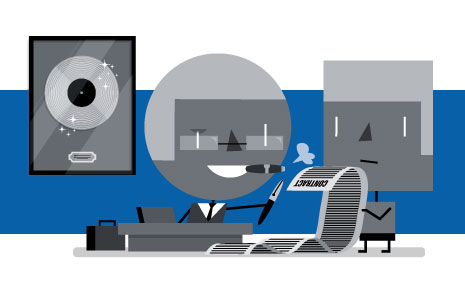6. Protecting Yourself
Back to the Composer’s Toolkit main page
As an emerging composer, you will frequently be in uncharted waters. To avoid disadvantageous conditions, always arm yourself with as much information as possible. If no contract has been offered, ask the performers or promoters how your work will be used (will it simply be performed live, will it be recorded, are there plans for a recording to be put online?) so that you have a chance to have your say and to make the most of what is happening. If a contract is on the table, ask friends and colleagues from your network about their experiences in similar situations and research online to find out about rates and conditions.
On occasion, you might like to get independent advice – especially when it comes to fees and contracts. Specialist music lawyers are an option, but a less expensive alternative could be to join a trade association like The British Academy of Songwriters, Composers and Authors (BASCA) or the Musicians Union (MU). A BASCA professional membership costs £165 a year and includes specific legal advice, a tax helpline, and advice on professional matters from experienced composers from the organisation’s board. An MU membership costs £183 a year and includes legal assistance, career and business advice, and a contract advisory service. An ISM membership (Incorporated Society of Musicians) costs £164 a year and includes legal support, tax support and professional development.
With every new project, it’s a good idea to revisit the aims you have set yourself to establish how the project fits in with what you are trying to achieve. Be conscious of the value of your work and don’t give something away for free unless you are clear about your reasons for doing so. This is not to say that you shouldn’t take on a project unless you get paid hard cash. There are other things you can get out of a project, such as documentation or promotion, which have their own values. You might, for example, not receive a fee for a new work you have composed, but the ensemble is giving your work exposure by performing it and they are making a recording of it which you will be able to use for promotional purposes.
Substantial fluctuation in income is a reality for the majority of composers. You might get a big commission one year but then you go through a very dry spell for another year, which can be deeply frustrating. There are other aspects of your professional life which can be a struggle. Being a composer is a fantastic job when things go well but it can also make you feel exposed and vulnerable. Artists tend – almost by definition – to be more sensitive than the average person, yet they are exposed to direct and often public criticism. You might have slaved over a composition for months and taken great pride in its first public performance, but if a critic finds fault with it very publicly it can be tough to deal with. Additionally, writing music is quite a solitary process, which can leave you feeling isolated.
None of this should put you off from being a composer. Just be prepared for those bad patches you will, as in any job, almost inevitably go through. To stave off unhealthily negative thoughts and feelings, make sure you set up a support system you can fall back on. You could form a collective with other artists, set up regular get-togethers for like-minded composers and performers, join an online forum, or make a pact with a freelance friend (maybe from a completely different profession) to meet up once a month to talk about how things are going.
A closing thought by John Cage: Ideas are one thing but what happens is another. There can be many interpretations of this quote, but for the purpose of this Toolkit, the interpretation could be: As composers, you have amazing, exhilarating ideas, but what happens with your ideas depends on your other, secondary skillset. Just how well you learn to finance, promote, organise, and protect yourself determines how professional and successful a composer you will be.
Previous: ← Self-Publishing Your Music
Next: → Links and Resources


